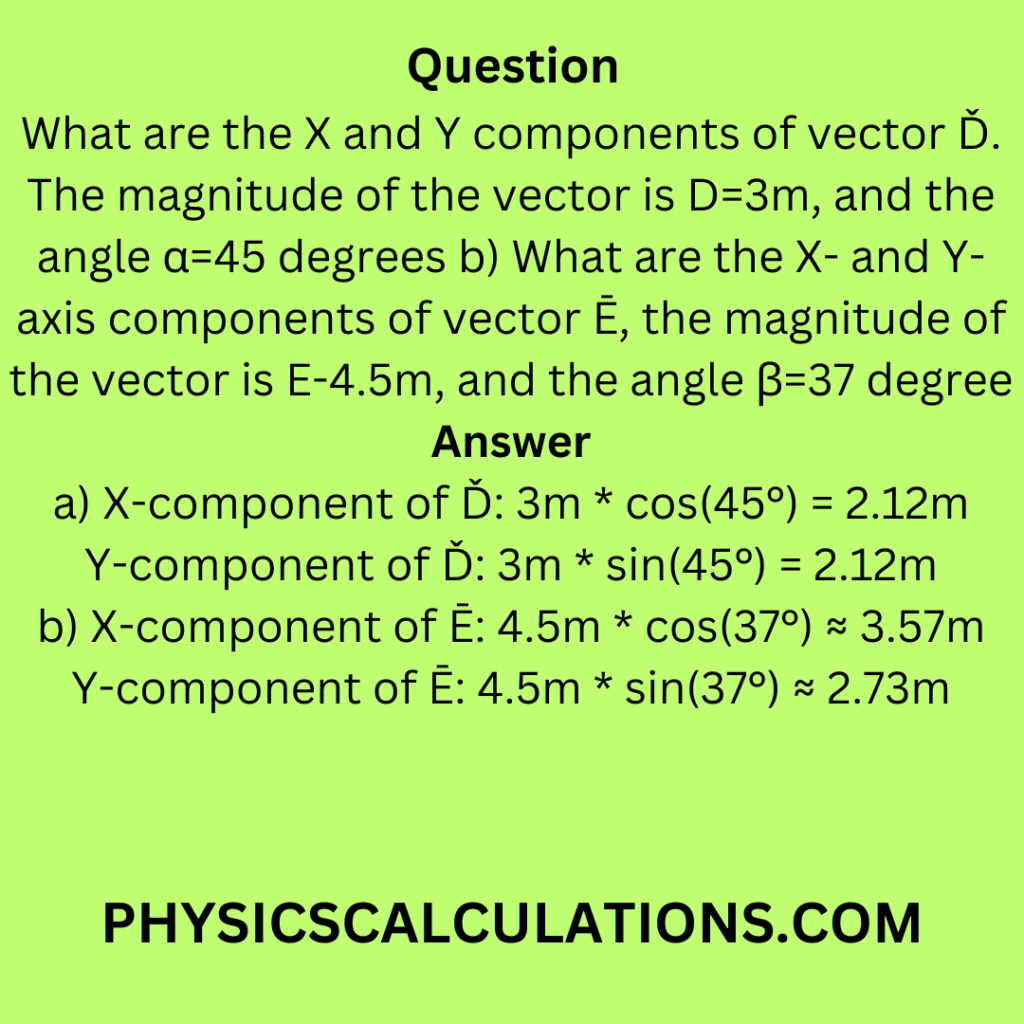Question
What are the X and Y components of vector Ď. The magnitude of the vector is D=3m, and the angle α=45 degrees b) What are the X- and Y-axis components of vector Ē, the magnitude of the vector is E = 4.5m, and the angle β=37 degree
Answer
a) X-component of Ď: 3m * cos(-45°) = 2.12m
Y-component of Ď: 3m * sin(-45°) = -2.12m
b) X-component of Ē: 4.5m * cos(37°) ≈ 3.57m
Y-component of Ē: 4.5m * sin(37°) ≈ 2.7m

Explanation
Our task is to find the X and Y components of two vectors, Ď and Ē, given their magnitudes and angles. Vector components are essential in physics and engineering to understand how forces or displacements act in different directions.
Vector Ď:
a) To find the X and Y components of vector Ď, which has a magnitude D = 3 meters and an angle α = 45 degrees, we can use trigonometric principles. Here’s how we break it down:
- X Component (Dx): This is the component of the vector in the horizontal direction (parallel to the X-axis). We can calculate it using the cosine of the angle α. Dx = D * cos(α), Dy = 3 m * cos(45°)
- Y Component (Dy): This is the component of the vector in the vertical direction (parallel to the Y-axis). We can calculate it using the sine of the angle α. Dy = Dy * sin(α), Dy = 3 m * sin(45°)
Calculating the values:
Dx ≈ 2.12 m
Dy ≈ 2.12 m
Vector Ē:
b) To find the X and Y components of vector Ē, which has a magnitude E = 4.5 meters and an angle β = 37 degrees, we will use the same trigonometric principles:
- X Component (Ex): Calculate the horizontal component using the cosine of the angle β. Ex = E * cos(β) Ex = 4.5 m * cos(37°)
- Y Component (Ey): Calculate the vertical component using the sine of the angle β. Ey = E * sin(β), Ey = 4.5 m * sin(37°)
Calculating the values:
Ex ≈ 3.6 m
Ey ≈ 2.7 m
Summary:
To summarize, we have now found the X and Y components of both vectors:
Vector Ď:
Dx ≈ 2.12 m (X-component)
Dy ≈ 2.12 m (Y-component)
Vector Ē:
Ex ≈ 3.6 m (X-component)
Ey ≈ 2.7 m (Y-component)
These components describe how the vectors Ď and Ē act in the X and Y directions, respectively. Understanding vector components helps us to analyze and solve complex problems involving forces, displacements, and more, which is especially useful when working with objects moving in two-dimensional space.